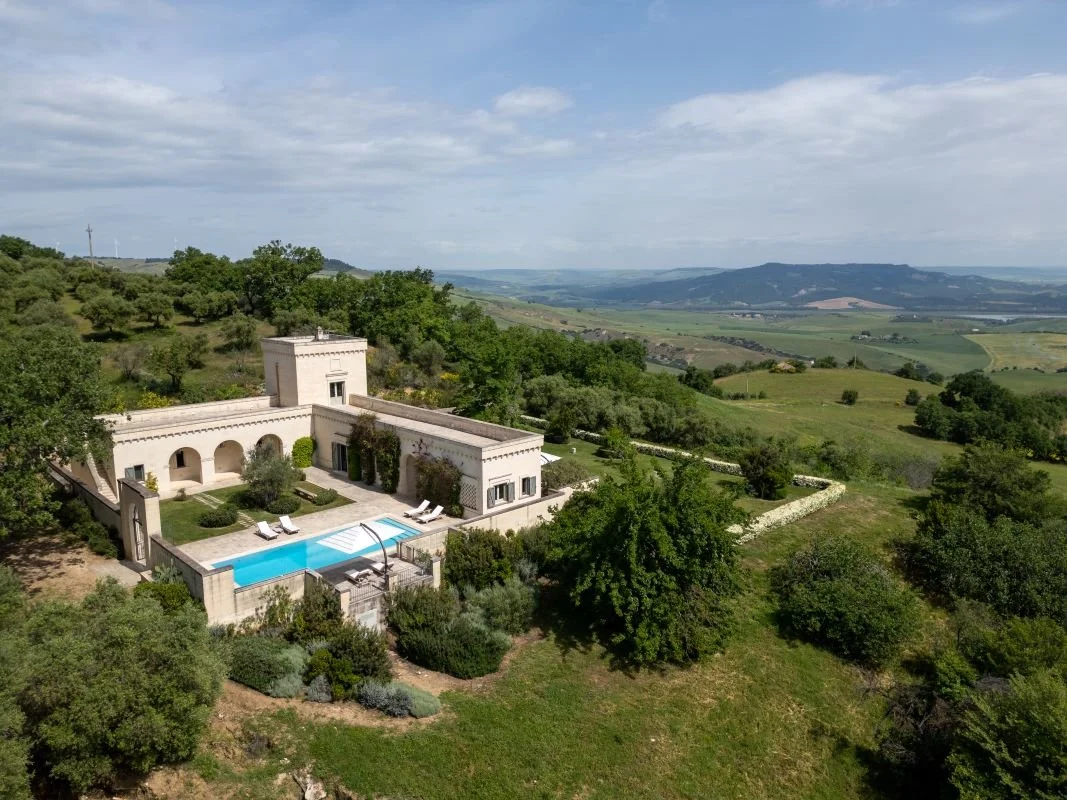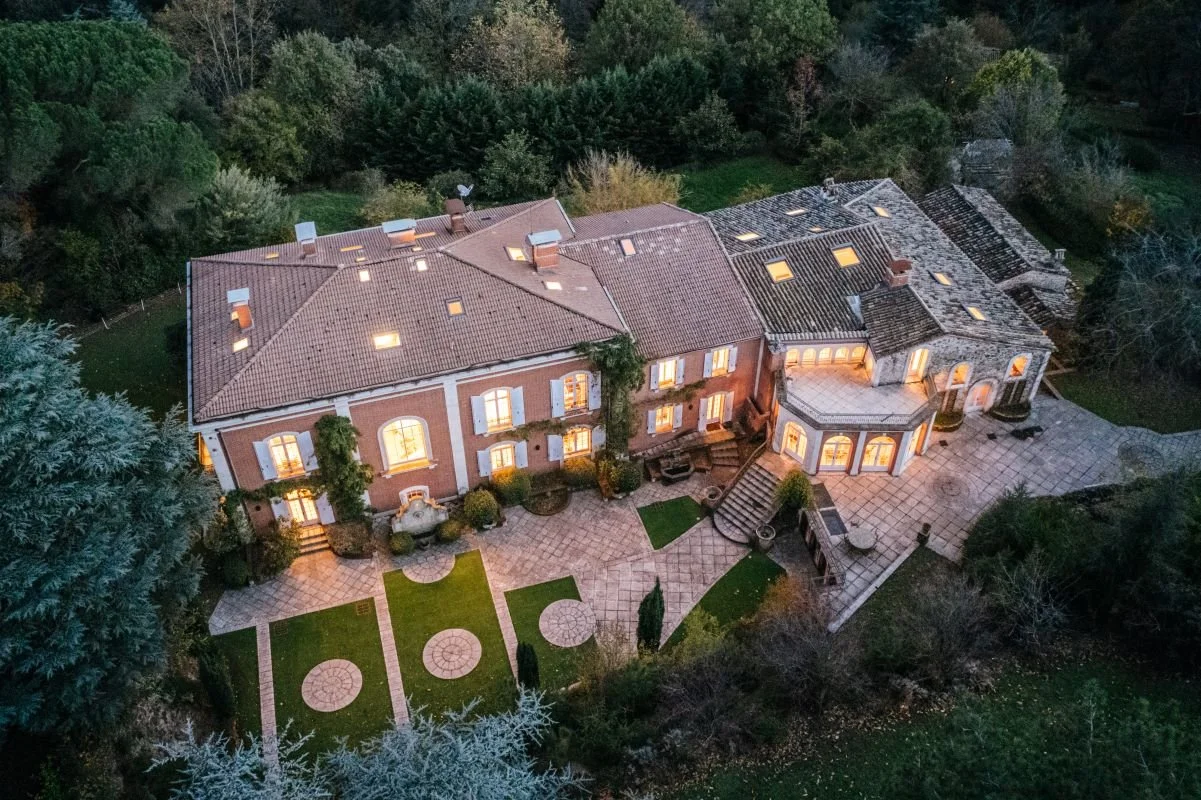
The New Theatre of Luxury Real Estate
Corning, Finger Lakes Area, NY with Concierge Auctions. List price $3.75m
From lavender-lined rooftops in Paris to billion-dollar follies in Bel-Air, the property auction has been reborn — not as a mechanism of urgency, but as a spectacle of curated desire. In a market where time is the ultimate luxury, the gavel is fast becoming the final word.
It begins, as these things often do, in Paris. Lavender, boxwood, an avenue of roses and some idea of Paris that still exists only in perfume adverts. The views are requisite: Eiffel Tower, Invalides, Pont Alexandre III. Views that have become symbols of themselves, shrunk to the size of Instagram stories, abstracted into a lifestyle proposition so pure, so distilled, that the apartment — a tasteful one-bedroom in the 7th arrondissement — need hardly exist at all.
The apartment in question is for sale. But not in the old-fashioned, slightly shameful way of estate agents and private listings, with their folded arms and Range Rovers. No — this is auction. Public, theatrical, final. The gavel is to fall online. The bidding starts, and within 60 minutes, the apartment, the views, the roses, and the ghost of Cocteau will pass to the highest bidder..
Such is the modern condition of luxury. It must now perform.
From Pauper’s Pit to the Billionaire’s Ballet
The auction was once the preserve of the liquidated and the deceased. Distressed sales, repossessions, dereliction. But in a world where exclusivity must also be efficient, where buyers confuse rarity with delay, auctions have undergone a curious transformation.
What was once a mechanism of last resort has become a signalling device — not of desperation but of curation. What was once considered an eccentric or desperate route is now a strategic one — and it’s reshaping the landscape of luxury real estate.
Sotheby’s Concierge Auctions, now part of the house that once flogged Fabergé eggs and Impressionists, will only handle what it calls “the top 5%” of submissions. It has brokered over $4 billion in property sales across 35 countries, including multiple homes north of $20 million. These are not houses. They are global liquidity events.
Bend, Oregon with Concierge Auctions. List price $9.99m
Swan Manor, Nissequogue, Gold Coast, NY with Concierge Auctions. Previously Listed at $20M | Starting Bids Expected Between $4M-$7M
Gamified Grandeur
The explanation for this is deceptively simple. In a world shaped by streaming platforms, story arcs, countdown clocks, and a pseudo-urgency, the idea of buying a house the old way — with surveys, counteroffers, and waiting — is intolerable. Time, for these people, is not money. It is an inconvenience.
Auctions, then, provide a tonic. They are definitive. They are visible. They are entirely devoid of the embarrassment of negotiation. They also, critically, provide a spectacle — and luxury today is nothing if not performative.
For buyers, they offer an emotionally thrilling, real-time opportunity to acquire something truly unique — a modern form of luxury consumption that aligns with the gamified behaviours of younger, affluent consumers.
The platforms know this. Venteu, Knight Frank’s auction child, speaks earnestly of “structured excitement” and “anonymised tension.” Drouot.immo, a Gallic offshoot of the venerable Hôtel Drouot, is auctioning Provençal villas and seaside Cannes retreats with all the solemnity of a Degas sale. The idea is not merely to sell but to narrate. The buyer becomes not just an owner, but a protagonist. The buyer does not simply transact. They participate in a story — one where ownership is not just assumed, but won.
And it is working well with a new and affluent audience. The lavender-scented rooftop apartment in the 7th arrondissement, overlooking Les Invalides and the Eiffel Tower, is starting at €7.5 million. In London, Sotheby’s Concierge Auctions recently sold a Holland Park flat for £4.14 million — and several other UK homes, once marketed traditionally, are now being rerouted through the auction model.
These clients — often older and selling legacy homes in ski resorts, beach towns, or heritage cities — are finding a surprisingly eager buyer pool on the other side. Often in their 30s and 40s, today’s buyers expect digital access, instant feedback, and a compelling experience. “For them, the traditional, opaque sales process feels archaic,” says Dr. Daniel Langer, CEO of luxury consultancy Équité and professor at Pepperdine University. “The gamification of luxury is not just accepted — it’s expected.”
Villa near Matera, Italy. Listed with Venteu. Listed for €750,000 / Sold for €1,925,000
The Great Wood, Lasalle with Venteu. Listed for €1,500,00 / Sold for €2,500,00
The Fragile Illusion of Transparency
And yet. Beneath the froth, there remains the inconvenient question of substance. And beneath the gloss, the performance can falter. While some sales do, indeed, exceed expectations — a villa in Matera reportedly achieved €1m over estimate — others wither in full view. In May, two London homes failed to meet their opening bids, and were withdrawn mid-auction, red-faced but unrevealed.
Meanwhile, lawsuits in the U.S. allege that some auctions employ “phantom bidders” — a sort of theatrical warm body to drive up interest. Of course, real estate, like religion and the theatre, thrives on belief, and there’s always a new buyer willing to suspend disbelief.
Auction as Theology
The deeper truth, perhaps, is that the luxury auction is not really about property. It is about time, and control, and the fantasy of finality. It is the theatre of transaction. The bidders are anonymous, the timer counts down, the hammer falls — and like all good rituals, it ends in revelation.
Luxury auctions are not really about bricks and mortar. They are about the fantasy of control, the performance of exclusivity, and the fiction of competition. The timer counts down. The names remain hidden. The hammer falls. And a moment — not just a house — is claimed.
What these auctions sell, above all, is the illusion that one has won something. That the property wasn’t just bought — it was conquered. And that in a world of spreadsheets and “quiet luxury,” there remains a space, however artificial, for drama.
They provide, above all, the illusion of triumph. The buyer is not merely a consumer but a victor. In an era of spreadsheet-led discretion and “quiet luxury,” auctions remain one of the few domains where desire is still allowed to be loud.
Whether this model endures depends less on market economics than on attention spans. Luxury is moving away from possession and towards experience. The future of luxury is not in things, but in moments. Auctions — brief, choreographed, emotive — provide precisely that in tightly choreographed, emotionally loaded, and globally streamed events.
They are not sales. They are ceremonies.

"What’s being purchased is not just property, but a moment — orchestrated, witnessed, and won."
Cannes Californie with Drouot. Starting from €9,300,00




